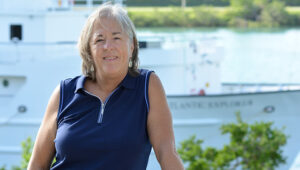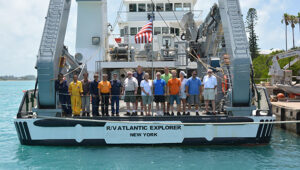Military Experience “Essential for the Job”

Susan Brittner came to Bermuda in 2007 when her husband, Darrel, transferred for work to the Fairmont Southampton hotel. After almost two years in Bermuda working at a bank, she saw the posting for the marine operations position. “I felt like someone had written that ad specifically with me in mind,” she said. Brittner, 59, helps to coordinate the schedule for the 170-foot BIOS research vessel Atlantic Explorer, a job that daily requires a multitude of decisions and skill sets. After spending more than 20 years in the Canadian Navy, she said she “really couldn’t ask for a more appropriate place to wind up.”
How has your military experience been helpful in your role at BIOS?
During my military career I was fortunate to gain training and experience in a variety of fields: in logistics, finance, administration, personnel training and management and operational readiness, and scheduling, among other things. Additionally, my military career taught me to multitask, to accept additional responsibilities without regard to immediate compensation, and to work with individuals and groups of differing languages, cultures, ages, and backgrounds. My military experience taught me that the success of the mission is very dependent upon a “can-do” attitude.
What are your job responsibilities?
Within the run of a day, I’m routinely involved in dozens of different tasks related to the Atlantic Explorer. An overview: manage and coordinate all crew rotation, travel arrangements and reimbursements; manage the replenishment cycles of ship’s provisions, medical and safety supplies, licenses and certificates; and research and order ship’s supplies.
I also solve logistical issues that arise which might impact the ship’s schedule. I perform research, calculate statistics, prepare budgets, compile technical data, and organize and submit information for four National Science Foundation proposals. I maintain current and future draft ship schedules using data submitted from scientific institutes and researchers; and monitor, complete, and submit various reports to University National Oceanographic Laboratory System.
I assist in the planning and execution of annual shipyard visits including forward planning prior to the vessel’s visit. This includes proposals for annual resupply for the ship and office, making accommodations and travel arrangements, arranging U.S. Immigration documentation, and liaising with shipyard staff to facilitate the visit.
Finally, in the absence of the marine superintendent, I maintain an on-call presence to respond to emergency or urgent situations involving the ship and crew.

How do you spend your time outside of work?
Some of the things I love so much about Bermuda are the beautiful venues for two of my favorite activities: golf and time at the beach. During the cooler part of the year I love to golf with my husband and in the summer we spend time at the beach. I’m also an avid reader and I usually have several books on the go at any one time so that I can read whatever matches my mood. Nonfiction, particularly biographical history is my first preference but I also enjoy well-written military or psychological thrillers.
What is the most satisfying aspect of your work? The biggest challenges?
I’m involved with a fantastic, diverse group of people filling a multitude of different roles. I get to play a critical role supporting them in the important work they do aboard the Atlantic Explorer. My biggest challenge has always been the nonstop period from September and October through February and March. Our cruise schedule in the fall is typically jam-packed (this year the Explorer will be at the dock for a total of only 17 days from August 3rd to December 15th) and the busy fall season is often immediately followed by a trip to a U.S. shipyard. There, everyone works virtually nonstop to accomplish hundreds of small and large repairs, projects, and tasks in what is always a compressed timeframe. This six-month period is definitely not for the faint of heart. You just put your head down, soldier on, and come up for air in small gulps. Despite all the fun and excitement I’ve had in prior jobs, I will say that this is the best job I’ve ever had because it requires that I tap into so many facets of my experience to fulfill the responsibilities.
